While data storage of leads and contacts is the primary use of customer relationship management (CRM) software, email communications within the CRM is typically the next most valuable feature. The best CRMs for email marketing offer easy-to-use, cost-friendly tools for creating, deploying, and automating campaigns. After evaluating dozens of CRMs with email capabilities, we’ve identified the eight best CRM email marketing platforms:
- Best overall: HubSpot CRM
- Great for omnichannel engagement: Freshsales
- Best CRM extension for Gmail: Copper CRM
- Excellent artificial intelligence (AI) email analytics: Zoho CRM
- Great all-in-one email CRM system: EngageBay
- Solid platform for mass email campaigns: Mailchimp CRM
- Best for mobile email capabilities: Salesforce Essentials
- Solid email tool with complete lead management: Nimble
Personalize engagement, shorten your sales cycle, and grow your business with Freshsales |
|
Best CRM for Email Marketing Compared
Provider | Starting Monthly Price per User* | Free Plan? | Our CRM Rating out of 5 |
|---|---|---|---|
$15 | ✓ | 4.74 | |
$9 | ✓ | 4.73 | |
$23 | ✕ | 4.67 | |
 | $14 | ✓ | 4.66 |
$13.79 | ✓ | 4.61 | |
$13 | ✓ | 4.34 | |
$25 | ✕ | 4.14 | |
$24.90 | ✕ | 4.09 | |
*Based on annual billing; monthly billing is also available for slightly higher rates.
HubSpot CRM: Best CRM Email Marketing Platform Overall

Pros
- Free plan for unlimited users includes mass email, automation, and stored email templates
- Advanced tools for tracking email engagement and running A/B tests on email campaigns
- Strong platform usability ratings for navigating the interface and operating email tools
Cons
- Not a cost-friendly option after Free plan
- Email A/B testing not available until Professional plan
- Limited email automation on Free plan to just one automated action
- You want advanced email marketing capabilities: HubSpot is just as good at tracking campaign performance as it is at letting users create and send emails. Its advanced tools include A/B testing, health reporting to monitor your business’ reputation as a sender, and data-based insights on messages telling you how to improve engagement. Users can also design full omnichannel campaigns for email outreach with other channels like text, social media posts, and ads.
- You need free email features: HubSpot is arguably the best free email marketing CRM system as it allows unlimited users and has robust email features. For instance, the system allows up to 2,000 sends per month, five stored email templates, and reply and health tracking. Plus, it has list segmentation and up to one automated action to auto-deploy messages based on contact details or events, all at no cost.
- You need scalable paid plans: While it has excellent free tools for sending mass emails and deploying campaigns, all of the paid plans, whether you bundle or purchase them individually, are expensive and not cost-effective for fast-growing businesses.
- Alternative: Zoho CRM and Freshsales are the two most cost-scalable solutions with a free-forever option.
- You want low-cost A/B testing for emails: HubSpot does provide A/B testing on email campaigns where users can directly compare two variations of campaigns in terms of content, structure, or message to see what factors impact engagement. That capability, however, isn’t available until the Professional plan.
- Alternative: Mailchimp has the lowest cost A/B testing on email campaigns, starting at $13 per month for three users.
HubSpot CRM Pricing Plan & Overview*
*Pricing is based on annual billing on a per-month breakdown. Monthly billing is also available for a higher cost. Each plan offers a 14-day free trial.
**CRM Suite includes sales, marketing, customer service, content management system (CMS), and operations software. Individual modules can be purchased for lower monthly costs.
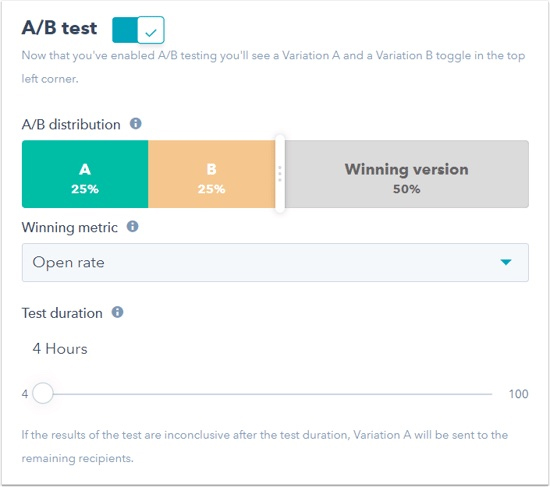
HubSpot creating email A/B test (Source: HubSpot)
Our Expert Opinion
We love how HubSpot provides value to startups, larger teams, and marketing agencies. New businesses needing a free, easy-to-use email market solution can adopt HubSpot’s mass email and performance tracking tools to create their campaigns. Alternatively, sales and marketing teams, including those providing marketing as a service, can purchase HubSpot’s higher-tiered plans for advanced email marketing tools like A/B testing, multi-action automation, and incorporation into other outreach channels.
HubSpot offers teams powerful sales, marketing, and customer service features in one software suite. See if it meets your business requirements and needs using our full HubSpot CRM review with complete product details.
Freshsales: Best for Supporting an Omnichannel Strategy

Pros
- Growth plan includes email sync, bulk email, and automated sequences
- Low-cost and scalable plans
- Omnichannel communication options that include phone, text, chatbot, and integration with messaging apps in addition to email
Cons
- Lacks advanced email analytics tools like A/B testing
- Email creation tools limited to pre-stored templates and manual design
- Sales email capabilities require the lowest-tiered paid plan
- You sell business-to-business (B2B): In addition to excellent email CRM tools, Freshsales is considered one of the best B2B CRM systems because of its built-in modules. These include account and deal management, lead monitoring and scoring, sales quota tracking, a built-in phone system, invoices and quotes, and appointment scheduling tools. Teams can also go omnichannel by using email to supplement the product’s live chat, chatbot, text, and messaging app tools.
- You want to use an affordable email management features: Freshsales’ Growth plan, which only cost $15, per user, monthly, is packed with solid email CRM features. These include two-way email data sync with Gmail and Outlook and the ability to send and receive emails from the CRM. Additionally, Freshsales lets users distribute mass emails, manage a team inbox, and design sequences that auto-send nurturing campaigns to leads.
- You need advanced, built-in performance tracking tools for campaigns: Unlike some of the other products on this list, Freshsales lacks advanced analytics tools, such as A/B testing or content insights. Users must subscribe to and integrate with Freshmarketer for those capabilities.
- Alternative: The HubSpot CRM suite includes campaign intelligence features with its CRM system.
- You want a built-in email design assistant: While Freshsales does have built-in AI tools to provide suggestions and act as a sales assistant, there are no intelligent tools for helping users design emails and campaigns. Teams are limited to storing premade templates that they created.
- Alternative: HubSpot and Mailchimp offer advanced email design tools, A/B testing, and digital assistants to optimize email content.
Freshsales Pricing Plan & Overview*
Freshsale has a free plan and a 21-day free trial for its paid plans. There are optional add-ons users can purchase with subscription plans, such as additional automated workflows that let users put tedious tasks like email follow-ups, CRM record updates, or user assignment notifications on auto-pilot. These cost $5 for every 10 additional workflows. Users can also purchase additional phone credits for $5 to place and receive calls from the CRM.
*Pricing is based on annual billing on a per user, per month breakdown. Monthly billing is also available for a higher cost.
Freshsales email campaign dashboard (Source: Freshsales)
Our Expert Opinion
Based on our evaluation, Freshsales performs very well in email marketing capabilities thanks to its affordable tools, ease of use, and automation capabilities. We found the automated sales email sequences go particularly well with business-to-business (B2B) lead nurturing as Freshsales also has robust deal management features. We also like its extensive communication channels—allowing teams to execute a full omnichannel strategy through phone, email, chat, text, and third-party apps.
Like what you see? Get the full picture of this excellent CRM product in our Freshsales review to see if it’s right for your business.
Copper CRM: Best Gmail Extension Tool

Pros
- Highly intuitive CRM with an interface similar to Google apps
- Unique Google Chrome extension that allows users to access and view CRM data directly in Gmail
- End-to-end email capabilities for creating templates, pulling contact data for messages, deploying, and automating emails
Cons
- No free plan
- Expensive email sequence, automated campaign, and lead scoring features
- Mass email not available until Professional plan
- You want to access your CRM from Gmail: Copper is a CRM built specifically for Google users and is ranked as one of the best Google CRM systems. What makes this product special is the Google Chrome extension that lets you access the CRM as a sidebar to pull data and files, update records, and track activity from Gmail’s interface. This makes sending personalized, direct emails from Gmail easy using CRM data.
- You need a highly intuitive email CRM system: Since it’s designed for Google Workspace teams, the Copper interface is designed similarly to Google apps. As most users find Google products easy to operate and navigate, those same benefits can be obtained by using Copper as a CRM.
- You need a cost-friendly email automation solution: Copper’s main downfall as an email marketing CRM is that some key email tools are expensive—only available on the Professional and Business plans. Bulk email, automated sequences, and lead scoring, for example, are not included in Copper’s Basic plan.
- Alternative: Freshsales includes all of those capabilities on the Growth plan, for only $9 per user, per month.
- You don’t use Google Workspace products: An obvious scenario to look for an alternative is if your business uses other software tools not provided by Google, such as Microsoft Outlook and Exchange.
- Alternative: HubSpot is ranked as our best overall email marketing CRM with no design preference for Gmail or Outlook users.
Copper Pricing Plan & Overview*
*Pricing is based on annual billing on a per-user monthly breakdown. Monthly billing is also available for a higher cost. Copper comes with a 14-day free trial.
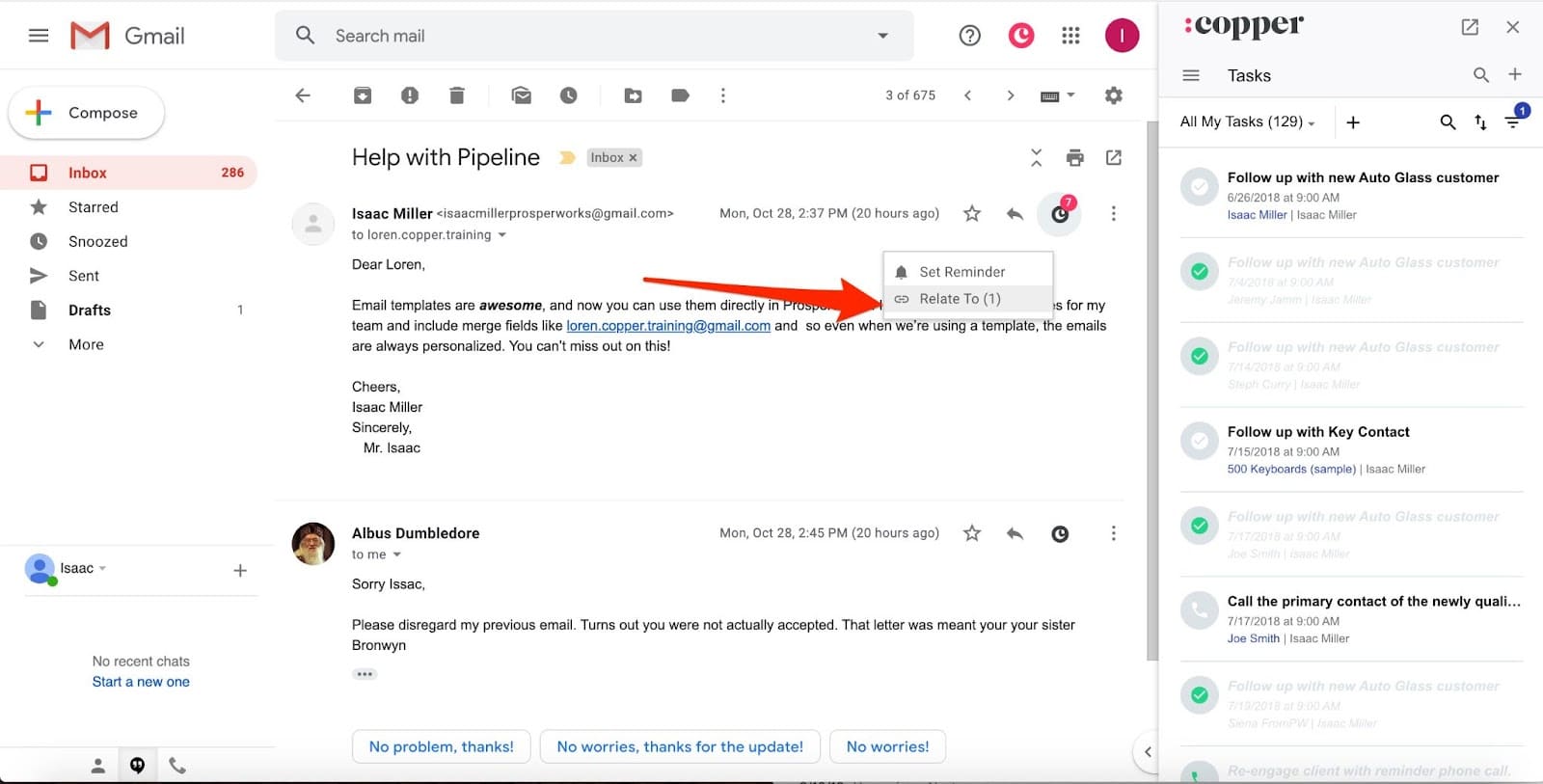
Copper CRM Google Chrome extension tool (Source: Copper)
Our Expert Opinion
Copper’s platform usability and unique Chrome extension tool put this CRM on the map as a solid email marketing solution. Despite its narrow use case, Google users can save time and ultimately get tons of value by accessing a CRM interface directly from Gmail. That particular capability makes it easy to extract CRM data, pull email templates, and ensure you are including the relevant context in your outreach campaigns.
Copper gives teams an easy-to-use CRM with a complete range of Google Workspace connections. See how it can help your business grow in our Copper CRM review.
Zoho CRM: Best for Artificial Intelligence (AI) Email Analytics

Pros
- Free and low-cost plans for solid scalability
- Sophisticated AI tools to analyze emails for users to customize messaging and productivity
- Robust workflow automation capabilities, including for scheduling and redeploying email outreach
Cons
- Poor experience ratings for setting up the CRM and operating features
- Email tools not available on Free plan
- Only up to 250 mass emails per day are allowed on Standard plan
- You want to use artificial intelligence (AI) for email insights: One of Zoho’s prime built-in capabilities is the AI analytics Zia tool. It has numerous use cases but stands out for its intelligence for emails. Teams can use Zia to automatically enrich contact records using email signatures, interpret the customer intent of an email response, capture event data from one click on a message, and summarize an email message without opening it.
- You are an account-based business: In addition to being an excellent CRM for email marketing, Zoho is considered a top pick for the best account management software. It has its own module for account management for tracking history and purchases, organizing contact data, and identifying key accounts. This pairs well with the built-in email capabilities to easily stay connected with important client accounts through automated, mass, and scheduled email.
- You need free email marketing tools: Zoho does offer a free plan for up to three users. While a great free option, users must subscribe to the Standard plan for email tools.
- Alternative: HubSpot, and Mailchimp are some of our favorite free combined CRM and email marketing platforms on this list.
- You want to mass-deploy thousands of emails per day: One notable restriction on Zoho’s email tools is the mass email capabilities. Users can only send a maximum of 250, 500, 1,000, and 2,000 per day on the Standard, Professional, Enterprise, and Ultimate plans, respectively. This isn’t ideal for online retailers who like to send daily campaigns out by the multi-thousands or anyone who needs more capacity for a low price.
- Alternative: Mailchimp is the best CRM for mass email deployment.
Zoho CRM Pricing Plan & Overview*
*Pricing is based on annual billing on a per-user monthly breakdown. Monthly billing is also available for a higher cost. Zoho CRM comes with a 15-day free trial for the paid plans.
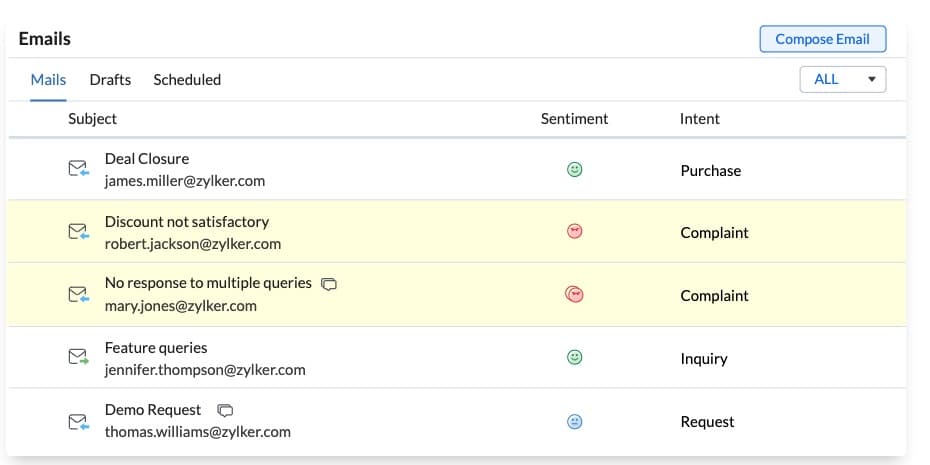
Zoho CRM Zia email intent detection (Source: Zoho)
Our Expert Opinion
Despite Zoho’s free plan not offering email capabilities, we like the sophistication you can get out of the CRM. The Zia AI tool can save small businesses hours of trying to update contact records, scroll through hundreds of email responses, and determine next-step actions by analyzing email responses for you. Zoho is also a great tool for email automation—allowing users to schedule mass email campaigns and automate customer journeys for lead generation and nurturing.
Zoho is a popular, highly customizable CRM with various best-use cases. Learn more in our Zoho CRM review, which has information on features, integrations, and pricing.
EngageBay: Best Free All-in-One Email CRM
Pros
- Email marketing capabilities, with automated sequences and audience segmentation, are offered on Free plan
- All-in-one sales, marketing, and customer service tool
- Most CRM features are included in Free or Basic plan
Cons
- Expensive email A/B testing tools
- Bad user reviews for product usability and interface navigation
- Relatively limited number of mass email sends allowed on all plans
- You want free email capabilities in your CRM: EngageBay provides its email features starting on the Free plan. The provider allows up to 15 users, 1,000 total branded emails, a message template builder and storage system, and up to two email sequences that automate message sends. Other useful free features include email scheduling, tracking for reads and responses, lead scoring based on email engagement, and audience list segmentation.
- You need an all-in-one sales, service, and marketing email platform: EngageBay offers all-in-one capabilities to manage sales opportunities, marketing campaigns, and customer service tickets in a single platform. Businesses that want a comprehensive CRM solution or use a revenue operations structure can get plenty of value by having all their data, templates, and activity reports in one interface.
- You need unlimited mass email sends: When you look at the number of mass emails allowed on all the EngageBay plans, they seem like a lot. Especially the Growth and Pro plans, which allow 25,000 and 50,000 sends, respectively. Broken down by day, however, that’s only a few hundred—not a great solution for many business-to-consumer (B2C) companies that like to deploy campaigns to the thousands each day.
- Alternative: Mailchimp is our pick as the best CRM email marketing solution for mass deployment.
- You want a minimal learning curve for your CRM: EngageBay is an all-in-one sales, service, and marketing platform offering many features—especially on its low-tiered plans. Unfortunately, users report that the CRM is tough to set up and operate, especially for those new to using a CRM system.
- Alternative: HubSpot and Mailchimp are some of our favorite simple email CRM systems, as well as Copper if you’re a Gmail user.
EngageBay Pricing Plan & Overview*
*Pricing is based on annual billing on a per-user monthly breakdown. Monthly billing is also available for a higher cost, and biennial billing is available for a lower cost.
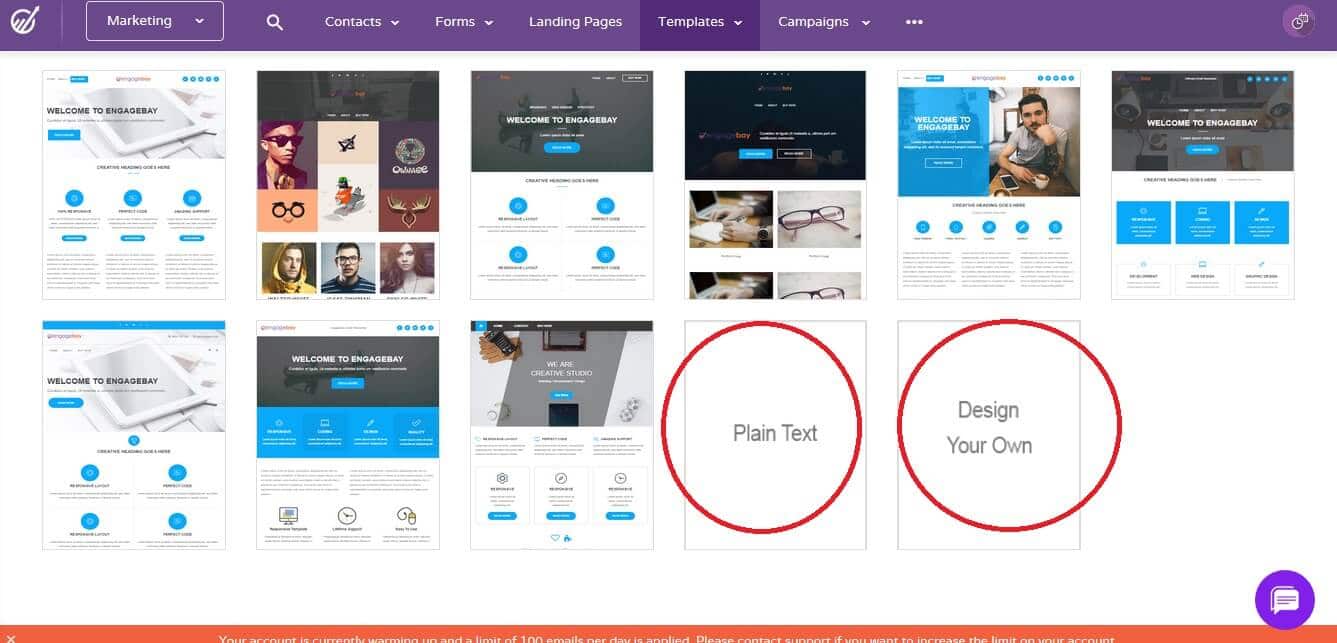
EngageBay email templates page (Source: EngageBay)
Our Expert Opinion
There’s no question about the value EngageBay can offer businesses, particularly small or solo-operated companies needing a personal CRM system. Its Free plan is one of the most robust products on this list and includes excellent email capabilities for constructing, sending, and monitoring email campaigns. Its comprehensive functions cannot be overlooked, as users can oversee all customer and revenue operations in one interface.
Mailchimp CRM: Best for Managing Mass Outreach Campaigns

Pros
- Cost-friendly plans with a free option
- Highly intuitive platform for creating emails and automating campaigns
- Unique mass email capacity based on contacts stored for solid scalability
Cons
- Free plan only allows one user
- Audience segmentation based on unlimited factors isn’t available until Premium plan
- Lacks traditional CRM features like deal tracking, account management, and pipeline reporting
- You need a complete marketing automation platform: Mailchimp is primarily email marketing software with some CRM capabilities like contact data management, profile tagging, activity tracking, and campaign performance reporting. But besides email tools, users can adopt Mailchimp for other campaigns and content development initiatives like web landing pages, social media posts, web forms, and digital ads on Google, Facebook, and Instagram.
- You specifically need mass email capabilities: Businesses in ecommerce, banking, real estate, retail, and auto insurance often use email as their primary outreach channel. That said, they cannot be restricted by email sends as they need to deploy potentially thousands of messages per day, or per week. Mailchimp is unique in that its monthly mass email capacity is dictated by contact records stored—providing excellent scalability of campaigns without restrictions.
- You prefer a traditional CRM system: Since Mailchimp is primarily a marketing tool with basic CRM features, it lacks more advanced capabilities in a sales CRM like lead management, deal tracking, account management, document storage, and pipeline reporting.
- Alternative: Freshsales, HubSpot, and Zoho CRM are great alternatives that take the top spots as the best CRM for small business.
- You need many free user seats: The Mailchimp free email CRM plan is limited to one user or 30-day free trials on the Standard and Essentials plans.
- Alternative: HubSpot and EngageBay are solid email CRM systems that give users an all-in-one sales, marketing, and service management platform.
Mailchimp CRM Pricing Plan & Overview*
*Pricing is based on annual billing on a per-month breakdown for the marketing platform. Monthly billing is also available for a higher cost. Mailchimp also offers a 30-day free trial for paid plans.
Mailchimp campaign performance dashboard (Source: Coupler.io)
Our Expert Opinion
Since it’s primarily used for email marketing, it’s clear why Mailchimp made this list. This software, however, should be adopted only if you need simple contact management and email tools—not advanced CRM functions like deal and account management. It’s highly intuitive to operate and has plenty of capabilities outside of email marketing. Even so, our favorite attribute of Mailchimp is the high number of emails users can send monthly, determined by stored contact records.
Planning to adopt Mailchimp for your sales and marketing operations? Check out our guide on how to use Mailchimp for email marketing to help optimize your campaigns.
Salesforce Essentials: Best Mobile Email CRM

Pros
- Mass and direct email, email sync and logging, and template storage all included in one plan
- Powerful mobile CRM app that lets users send, receive, and log emails plus create CRM records from messages on the go
- Highly customizable and has over 2,500 third-party and native integrations, including many tools designed for specific industries
Cons
- No free plan
- Learning curve required for setting up and operating CRM
- Pipeline analytics, lead scoring, and revenue forecasting not available on Essentials plan
- You do a lot of on-the-go sales: Salesforce offers an intuitive, robust mobile CRM application. Teams can complete nearly all web application functions in the mobile app, including record management, task tracking, and activity reporting. For email, users can receive, send, and log messages and create new records from emails. These capabilities are particularly useful for trade contractors, insurance agents, and other businesses that make a lot of sales on the go.
- You want to integrate your email CRM with industry-specific tools: Salesforce Essentials isn’t only a highly customizable system in terms of data fields and modules, it also has the widest range of third-party and native integrations. Businesses can quickly convert their general-use product into an industry-specific email CRM system by tailoring the interface and features and integrating with vertical-specialized tools in areas such as healthcare, financial services, and manufacturing.
- You want built-in lead scoring and advanced engagement analytics: Salesforce does offer advanced email analytics for content and audience optimization, as well as lead scoring based on contact engagement with campaigns. Those features, however, are not available on the Essentials plan.
- Alternative: Freshsales and EngageBay are best for low-cost lead scoring, while Zoho and HubSpot have the best analytics tools powered by artificial intelligence (AI).
- You need a free email marketing CRM: Salesforce Essentials is the cheapest CRM option of all the Sales Cloud products but does not include a free-forever option.
- Alternative: HubSpot and EngageBay are our favorite free email marketing CRM platforms with sales, marketing, and service features, while Mailchimp is best for a single user looking for robust marketing tools.
Salesforce Essentials Pricing Plan & Overview
Salesforce Essentials is the subscription designed by Salesforce specifically for small businesses. It has an annual billing cost of $25 per user, per month, and comes with a 14-day free trial. Its main CRM features include account, lead, and opportunity management, contact storage, sales task tracking, and a robust mobile application. Teams can also integrate the CRM with Gmail and Outlook to sync email data, send and receive emails from the CRM, run mass email campaigns, and store email templates.
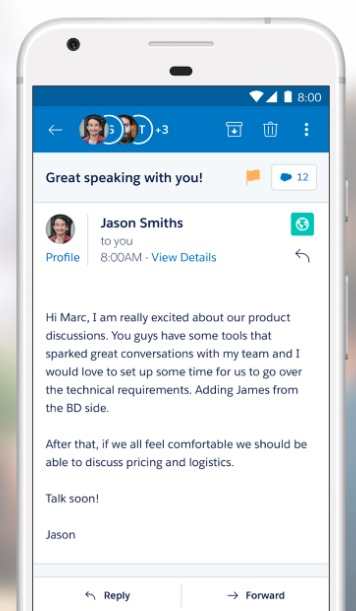
Salesforce mobile email (Source: Google Play)
Our Expert Opinion
While we know Salesforce Essentials isn’t the best CRM for email marketing in terms of cost or advanced capabilities, we can safely say it has a few attributes that provide a unique value proposition to users. Most notable are the mobile CRM capabilities for managing email campaigns on the go and solutions for overseeing an industry-specific sales operation. Its Essentials plan also has all the features for designing, distributing, and tracking email campaigns.
Salesforce Essentials helps small businesses to grow with its lead and account management features, email campaign tools, and automation capabilities. See if it’s right for your business by reading our Salesforce Essentials review.
Nimble: Best for End-to-End Lead Management

Pros
- Teams can use the CRM as an end-to-end lead management solution from prospecting to generation to closing
- Email tools include mass email, templates, tracking, send reminders, message syncing, and a unified inbox for all marketing channels
- Offers Outlook and Google Workspace add-on for accessing the CRM interface from your email system
Cons
- Only one paid plan available
- Lacks advanced email analytics tools to optimize email content
- Plan only includes up to 100 mass sends per day—additional cost for more
- You need prospecting tools in your email CRM: Nimble is the top end-to-end lead and sales pipeline management solution. Users can handle all parts of a customer’s journey, from prospect research to closing the deal. They can also access prospecting credits, 25 per user, per month, to unlock lead contact email and phone number data. There’s also access to enriched information from websites and social media profiles and it can auto-update CRM records to keep information current.
- You want an email CRM with a minimal learning curve: As an email marketing CRM, Nimble offers solid features and a small learning curve for its users. The outreach capabilities include mass email, contact list segmentation, email data sync, stored templates, and email tracking for responses and opens. At the same time, the interface offers a clean color scheme, clear navigation buttons, and intuitive tools that optimize the user experience.
- You want multiple CRM plan options: Nimble tries to keep it simple by only offering one CRM subscription plan. The downside is there are no free or scalable options to upgrade as your feature and capacity needs change.
- Alternative: Zoho and Freshsales are our favorite scalable email marketing CRM tools with numerous subscription options.
- You need advanced email analytics: The email analytics tools of Nimble are limited to just tracking opens and responses. There are no advanced intelligence tools like message health reporting, A/B testing, or a content design assistant.
- Alternative: HubSpot, Zoho, and Mailchimp are the best email CRM platforms for gaining insight into your email campaigns.
Nimble Pricing Plan & Overview
Nimble offers one plan that’s $24.90 per user, monthly, billed annually, and comes with a 14-day free trial. It includes contact and pipeline management, prospect credits that unlock contact info, calendar sync, workflow automation, and data enrichment through social profiles. It has email outreach features like mass email sends, stored templates, and email activity tracking with stay-in-touch reminders. Finally, Nimble has lead qualification tools that help users identify top leads based on engagement activity.
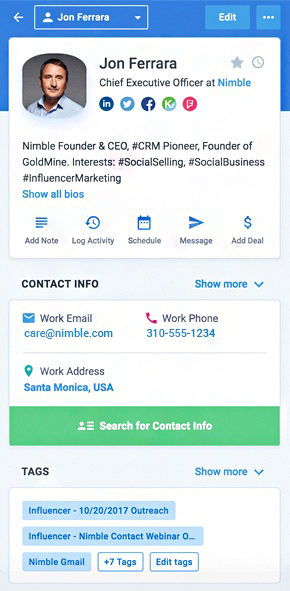
Nimble contact record with prospecting button (Source: Nimble)
Our Expert Opinion
Nimble offers all the basic email features, like mass marketing, templates, and engagement tracking, without a complex user experience. For its robust lead management features, we recommend Nimble for B2B companies that need to do prospect research on top of getting a deal through the pipeline. Finally, Nimble adds unique value missing from most CRMs on this list by offering a Gmail and Outlook add-on to access your CRM from your email system.
Nimble is known for its lead management, social media enrichment, and email marketing tools. Visit Nimble to see how else it can support your business.
How We Evaluated the Best Email CRM System
To determine the best CRM and email marketing software for small business, we evaluated the specific features relevant to creating, sending, and tracking email campaigns. Email automation, for instance, lets teams put campaign deployment and redeployment on auto-pilot based on audience engagement. We also looked at other critical product attributes, like price, customer support, and general features like a mobile application and access to third-party integrations.
The tabs below offer insight into our evaluation process of the best CRM for email marketing:
25% of Overall Score
Because most providers already offer email capabilities with CRM email automation, we first looked at overall features crucial to any CRM system, regardless of its primary use case. A mobile app, for instance, lets users manage email campaigns on the go. We also looked at the levels of system customization available, the range of third-party integration options, and the strength of the reporting and analytics tools to track email performance.
20% of Overall Score
Pricing for the best email marketing CRMs considered free plan availability and various scalable pricing options businesses could afford as they grow. We also looked at the availability for subscribers to pay monthly or save by paying annually or bi-annually. Finally, we looked at the costs of email CRM software tools for users to create and deploy campaigns.
20% of Overall Score
We evaluated niche features specifically for creating and managing email campaigns. Advanced contact management, for example, allows you to properly segment email lists for targeted campaigns. We also wanted to see if the providers offer premade email templates and robust automation so users could put their mass email outreach on auto-pilot.
20% of Overall Score
Extensive support and service help prevent poor user experiences and outcomes users may encounter while using any of the CRM email marketing software products on this list. Help and support were evaluated regarding service hours availability and the channel accessibility to support lines via phone, live chat, and email. We also looked at self-service and help center resources users can access, like tutorials, knowledge base articles, community forums, or training modules.
15% of Overall Score
In addition to firsthand experience with these email marketing CRM systems, we evaluated what actual users say about each product according to reviews. These criteria consider how customers feel to gain insight into value for the price paid, ease of use when operating CRM email tools, and how users feel about the CRM’s features overall.
Frequently Asked Questions (FAQs)
What is a CRM for email marketing?
A CRM for email marketing is a sales software that lets you create, deploy, automate, and track email campaigns or direct messages from the CRM system. Because CRMs are primarily used as digital Rolodexes and already store contact data, it’s easy to manage emails or add CRM contacts to an email list for direct outreach or mass campaigns.
Do all CRMs include email marketing?
Just about all CRM providers offer some level of email management or marketing capabilities. The level of sophistication included, however, will vary depending on the product. For example, some CRMs only allow you to log and track email communications from a contact record. Other more advanced CRM email marketing tools will go as far as having a creative or AI assistant actually help you optimize your messages to improve campaign results.
What should I look for in an email marketing CRM?
At a minimum, your email marketing CRM should let you send, receive, and log emails from your CRM through synchronization with Outlook and Gmail systems. Then, depending on your needs, you can evaluate other features. Mass email deployment, campaign design, stored templates, and message tracking, for example, are all great features for email marketing. Additionally, advanced tools like A/B testing, health reporting, and lead scoring help maximize campaign and sales performance.
Bottom Line
CRM email marketing platforms let teams manage messages and deploy mass campaigns from the same system in which they store their contact data. Email communications within a CRM are nearly an assumed feature your provider should offer. While we ranked HubSpot as the best overall email CRM for its free and easy-to-use email tools, other products could fit better depending on your needs. Zoho, for instance, has unique AI tools for analyzing email messages and enriching contact data.
